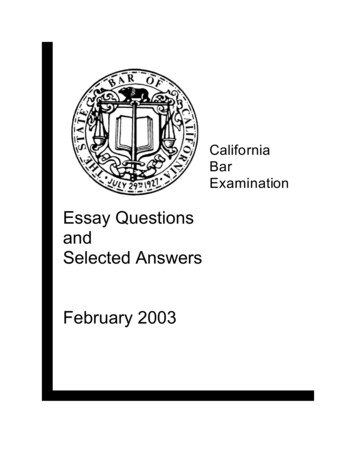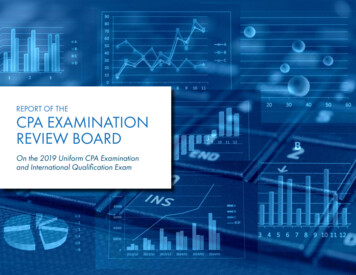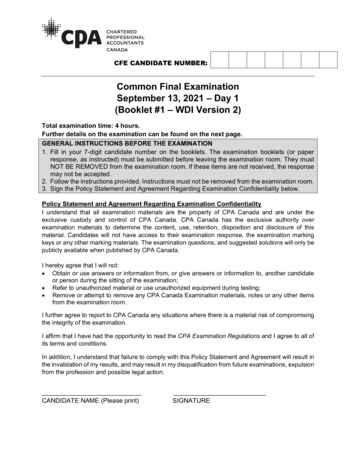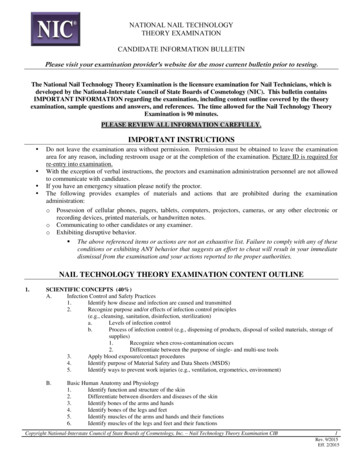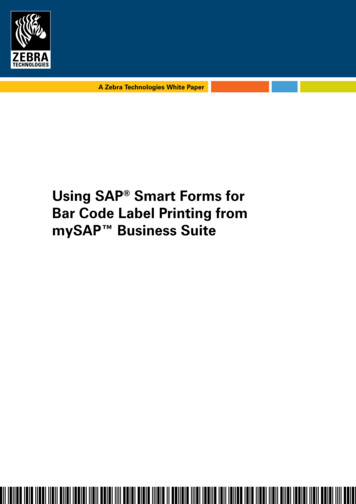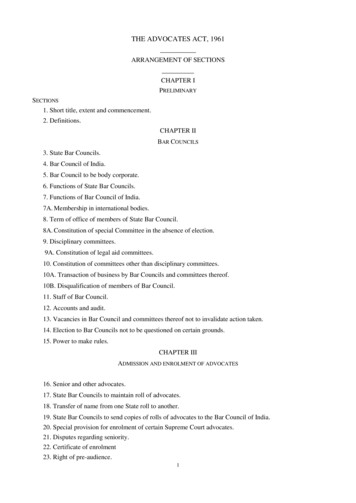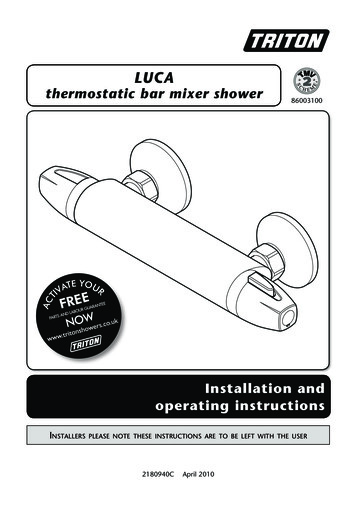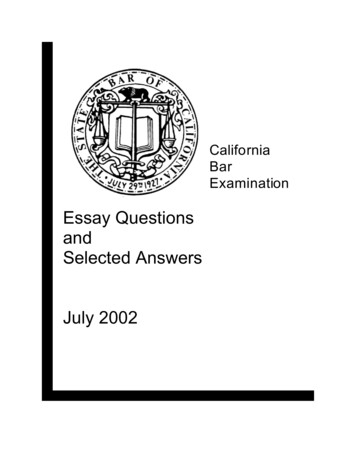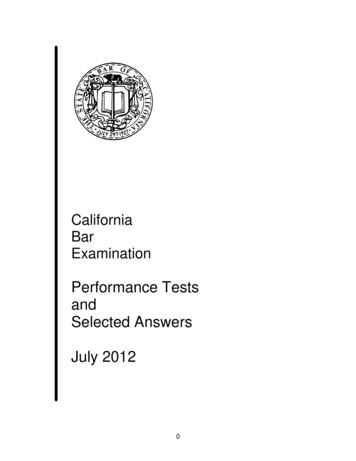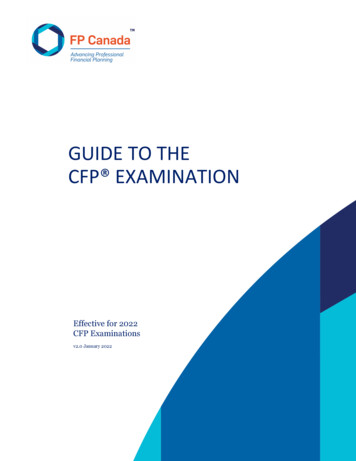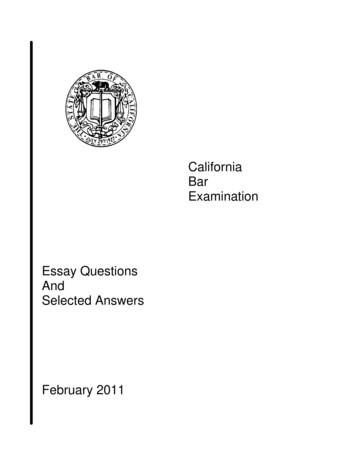
Transcription
CaliforniaBarExaminationEssay QuestionsAndSelected AnswersFebruary 2011
THE STATE BAR OF CALIFORNIAOFFICE OF ADMISSIONS180 HOWARD STREET SAN FRANCISCO CALIFORNIA 94105 1639 (415) 538 - 23031149 SOUTH HILL STREET LOS ANGELES CALIFORNIA 90015-2299 (213) 765 – 1500ESSAY QUESTIONS AND SELECTED ANSWERSFEBRUARY 2011CALIFORNIA BAR EXAMINATIONThis publication contains the six essay questions from the February 2011 California BarExamination and two selected answers to each question.The answers received good grades and were written by applicants who passed theexamination. The answers were prepared by their authors, and were transcribed assubmitted, except that minor corrections in spelling and punctuation were made for easein reading. The answers are reproduced here with the consent of their authors.Question NumberContentsPage1Wills and Succession2Constitutional Law153Real Property254Torts365Business Associations/ Professional Responsibility526Remedies/Evidence6513
FEBRUARY 2011ESSAY QUESTIONS 1, 2, AND 3CaliforniaBarExaminationAnswer all three questions.Time allotted: three hoursYour answer should demonstrate yourability to analyze the facts in question, totell the difference between material andimmaterial facts, and to discern thepoints of law and facts upon which thecase turns. Your answer should showthat you know and understand thepertinent principles and theories of law,their qualifications and limitations, andtheir relationships to each other.If your answer contains only a statementof your conclusions, you will receive littlecredit.State fully the reasons thatsupport your conclusions, and discussall points thoroughly.Your answer should evidence yourability to apply law to the given facts andto reason in a logical, lawyer-likemanner from the premises you adoptto a sound conclusion. Do not merelyshow that you remember legalprinciples. Instead, try to demonstrateyour proficiency in using and applyingthem.Unless a question expressly asks you touse California law, you should answeraccording to legal theories andprinciples of general application.Your answer should be complete, butyou should not volunteer information ordiscuss legal doctrines which are notpertinent to the solution of the problem.2
Question 1In 2004, Tess, a widow, executed a valid will leaving her estate to her children, Abel,Bernice, and Cassie per stirpes.In 2009, Tess, Abel, and Bernice quarreled and Tess decided to draft a new will. Shewent to an office supply store, got a preprinted will form, and filled in the following in herown handwriting:Because my son Abel and daughter Bernice have been unkind to me, Ispecifically disinherit them. I give and bequeath all my property toUniversity.Tess signed and dated the form. No one was present when she signed and dated theform and hence no one signed as a witness to her signature. At the time, she wasaddicted to prescription pain killers and was an alcoholic.In 2010, Cassie adopted David as her son. Soon thereafter, Cassie died, survived byDavid.In 2011, Tess died, leaving an estate worth 1,000,000.Tess’s 2009 will has been offered for probate.(1) What arguments can Abel and Bernice reasonably make in objecting to the validityof Tess’s 2009 will? Discuss.(2) Does David have any claim to a share of Tess’s estate? Discuss.Answer according to California law.3
Answer A to Question 1(1) What arguments can Abel and Bernice reasonably make in objecting to the validityof Tess's 2009 will?A. Was the first will revoked?Abel and Bernice can first object that Tess's 2004 will wasn't revoked by the subsequentwill drafted in 2009. A will can be revoked either expressly or impliedly. Expressrevocation requires the testator to use language that makes his intent clear that theoriginal will is revoked by a later will. A will can be impliedly revoked if the second willcontradicts with the first will and the second will bequeaths substantially all of testator'sproperty. Here, unlike in the first will where Tess left Abel and Bernice part of herestate, Tess specifically disinherited Abel and Bernice. A testator can disinherit thosewho would take if testator died intestate (here, her children) by expressly usinglanguage that she intends to disinherit them in her will. Because the second willcontradicts the first will and bequeaths all Tess's property to a different person(University), the will was validly revoked by implication and the second will can beprobated if it is proved valid. It is clear Tess intended the second will executed in 2009to revoke the 2004 will and not be a codicil because she specifically contradicts aprovision stated in her first will (to Abel, Bernice, and Cassie per stirpes) and then Tessin her later will left all of her property instead to University.B. Objection that 2009 will is not a valid will(1) Was this a valid attested will?California does not allow oral wills. Therefore, a valid attested will must be (1)Written, (2) Signed by Testator, (3) in the presence of 2 witnesses who have to signbefore testator's death, but not necessarily in his presence. Also, [if] testator doesn't4
sign in the two witnesses’ presence, it can be valid if he later acknowledges thesignature on the will as his with witnesses present, who sign then or before T's death.Even if there are no witnesses, as long as (1) and (2) (writing and signed by T) aresatisfied, extrinsic evidence or testimony can be offered that proves that T either inwriting or orally expressed his intent that this writing be his will. This has to be provedthrough clear and convincing evidence. Here, Tess's will is likely not a valid attestedwill. Even though the will was in writing and signed by Tess, there were no witnesses toher signature. For this will to be considered valid, there would need to be clear andconvincing evidence that Tess intended this to be her will or that later Tessacknowledged the signature as hers and witnesses sign. Since those facts are notincluded here, Tess's will is not a valid attested will.(2) Valid holographic will?Tess's will will likely be considered a valid holographic will. A holographic willdoesn't have to be fully in the testator's handwriting, but all material provisions must besolely in the T's handwriting. Material provisions include the beneficiaries who will takemust be named and specify the gifts they will receive. A holographic will must also besigned by T to be valid. Here, Tess's 2009 will includes all material provisions. Tessspecifically names University as the beneficiary and specifically names the gift they willtake - "all my property". Tess signed the will, satisfying the signature requirement. Theholographic will is also dated, which is not required but helps a court when a will isoffered for probate to know the order in which wills were executed. Even though the willwas printed on a preprinted will form, this is not of consequence. Therefore, since Tessnamed a specified beneficiary (University) and specifically named what property theywould take (all) in her own handwriting, and signed the will, all material provisionsrequired of a holographic will exist and Tess's 2009 will would be considered a validholographic will in California. For the reasons listed above, Tess's 2004 will wasrevoked, and her 2009 will should be probated, if it is found that Tess had the capacityat the time of execution of the 2009 will (discussed below).5
C. Did Tess lack capacity when the 2009 will was executed?A testator who executes a will must have capacity when the will is executed forthe will to be considered valid and to be offered for probate. Capacity requires severalthings: (1) T must be at least 18, (2) T must understand the natural objects of herbounty, (3) must understand the nature and value of property, and (4) T mustunderstand she is making a will. Here, Tess's capacity could be questioned becauseshe was both addicted to prescription painkillers and was an alcoholic at the time sheexecuted the will. A person could be considered to lack capacity normally but havetimes of being lucid. If the will is executed during a lucid period, then T will beconsidered to have met the capacity requirement. (1) The first element required forcapacity here can likely be assumed. It seems Tess is over the age of 18 since she wasalready widowed and had three children, and presumably died of natural causes notmany years after her 2004 will. (2) It appears that T understood the natural objects ofher bounty (her children). This is possible because she specifically refers to her childrenwho she knew would take either under her 2004 will or by intestate succession - Abeland Bernice. She made a point to disinherit them, and at least knew some of the naturalobjects of her bounty. Though, because Tess didn't list Cassie (who would also be anatural object of her bounty), it is possible she didn't understand all the natural objectsof her bounty. (3) It is not clear that Tess understood the nature and value of herproperty. She only stated "all my property". She didn't specifically list any property butonly made a blanket statement referring to the whole of her property. It is not clear thatshe understood the disposition of her property. (4) It is clear that Tess understood shewas making a will. Her language specifically "disinherited" two of her children and thenshe "bequeathed" her property to University. Tess also wrote these statements on apreprinted will form that she went to an office supply store to buy. It appears thatbecause Tess used certain language and wrote her bequests on a will form, sheunderstood that she was making a will. Because Tess didn't even refer to Cassie(which questions whether she understood the natural objects of her bounty) andbecause Tess only bequeathed "all" her property instead of listing out certain6
dispositions, it is possible that Abel and Bernice could prove that Tess lacked thecapacity to make the 2009 will.(2) Does David have any claim to a share of Tess's estate?A. CapacityIt is possible that David has a claim to Tess's estate. Adopted children inherit from theirparents just as if they were natural born children, so David will be able to take any giftthat his mother Cassie would've been able to take had she been living. If it is found thatTess lacked the capacity to execute the 2009 will (for the reasons listed above), and the2004 will was never validly executed, then David could take his mother's share that wasdevised under the 2004 will. Since Tess wanted her estate distributed to Abel, Berniceand Cassie per stirpes, that means that the estate is divided equally at the first levelwhere there is issue left (whether anyone is living on that level or not). Here, if Tess'sestate was divided per stirpes, Abel, Bernice and Cassie's issue - David - would allinherit equal shares - 1/3 of the estate.B. Pretermitted childIf the 2009 will is found to be valid, then David could argue that Cassie was apretermitted child, but this argument is likely to fail. A pretermitted child will be providedfor if they were born/adopted after a will was executed, were not provided for in the will,and (1) were not provided for outside of the will, (2) all the estate wasn't left to theirother parent, or (3) they weren't expressly disinherited. Here, because Cassie wasalready living when Tess's will was executed, she cannot claim as a pretermitted child,even though she wasn't expressly disinherited. David would not be able to argue underthe pretermitted child statute, even though he was adopted after the will, because he isthe grandchild and not child of T. Therefore, Cassie nor David would be considered apretermitted child and David does not have a claim under as a pretermitted child.7
Answer B to Question 11. Arguments Abel and Bernice can make objecting to the validity of Tess's 2009 Will:Revocation of the 2004 WillIn 2004, Tess executed a valid will leaving her estate to Abel, Bernice, andCassie. The issue is whether Tess's 2009 will revoked the 2004 will. A will may berevoked by a subsequent will (1) if the subsequent will is validly executed; and (2) if thetestator simultaneously had the intent to revoke the prior will. Revocation may beexpress (e.g., "I revoke all prior wills and codicils"), or implied (a) to the extent that thewills are inconsistent; or (b) if the subsequent will makes a complete disposition of thetestator's entire estate, then the prior will is revoked in its entirety.Here, [Tess] did not expressly revoke the 2004 will in her 2009 will, because the2009 will did not mention the prior will. However, Tess stated in her 2009 will that she"specifically disinherit[s]" her son Abel and Bernice. This statement is inconsistent withthe 2004 will's disposition of Tess's entire estate to her children Abel, Bernice, andCassie, so the 2004 will would be implicitly revoked as to its devises to Abel andBernice, provided that it is validly executed or a valid holographic will. Moreover, Tess's2009 will stated that she bequeaths "all my property to University," which is a completedisposition of her estate. As such, a court would likely find the 2004 will to be revokedin its entirety, if the 2009 will is valid.The issue, therefore, is whether the 2009 will is a validly executed attested will,or a valid holographic will.Validly Attested WillAbel and Bernice will argue that the 2009 will failed to comply with the requiredformalities for a validly executed attested will. To be valid, an attested will must be: 1) inwriting; 2) signed by the testator, or by another person in the testator's presence and ather direction; 3) the testator's signing or acknowledgement of the will must occur in the8
joint presence of at least two witnesses; 4) the two witnesses must sign the will withinthe testator's lifetime (though not necessarily in the testator's presence, or in thepresence of each other); and 5) the two witnesses must have understood at the timethat they were witnessing the testator sign her will.Here, Tess's 2009 will was in writing (on the preprinted will form), and shesigned and dated the document. However, there were no witnesses to Tess's signing ofthe will, and no witnesses signed the document. Thus, Tess's 2009 will failed to complywith the formalities required of a validly attested will.Clear and Convincing Evidence Exception After 2009After Jan. 1, 2009, a will which complies with the signature and writingrequirements, but fails to comply with the witnessing requirements, may nonetheless beadmitted to probate if the proponent of the will is able to produce clear and convincingevidence that the testator intended the document to be her will. Here, University (theparty who stands to benefit from the 2009 will being valid) will argue that, since Tess's2009 will was executed after this new rule went into effect, and since she signed andwrote portions of the will in her own handwriting, there is sufficient evidence to admit thewill into probate.This argument will probably fail. Abel and Bernice will argue that, as discussedinfra, the fact that Tess was on painkillers and was an alcoholic at the time she signedthe 2009 will weighs strongly against finding that there was clear and convincingevidence of her intent. Moreover, Abel and Bernice will argue that the clear andconvincing evidence exception is usually only successfully employed when a testatorattempts to comply with the witnessing requirements, but fails due to a technicality suchas the two witnesses not being jointly present at the same time, or failing to sign thedocument within the testator's lifetime.Here, Tess had no witnesses presentwhatsoever. Moreover, Tess created the will on a preprinted will form, rather than goingthrough the more formal procedure of having an attorney draft up a customized will.They will also point out that the will illogically does not mention Cassie. All of these9
circumstances will likely persuade the court not to apply the clear and convincingevidence exception in this case. As such, the 2009 will will not be admitted to probateas a validly attested will.Holographic WillUniversity will argue that, even if the 2009 will is not validly attested, it qualifiesas a valid holographic will. A holographic will is valid if (1) the material terms (includingall beneficiaries and bequests) are in the testator's own handwriting; and (2) the testatorsigns the will. A holographic will can indeed revoke a prior attested will (that wastyped).Here, all material terms in the 2009 will were in Tess's own handwriting. Thisincluded specifically disinheriting Abel and Bernice, and bequeathing "all my property toUniversity." Tess additionally signed and dated the will. (A holographic will need not bedated, but an undated holographic will would be invalid to the extent that it conflictedwith other wills. Since this will was dated, that is not a problem.)Abel and Bernice will argue that not all material terms were included in Tess'shandwriting because she failed to mention Cassie in the 2009 will. This argument willlikely fail. Tess's statement in her own handwriting that "I give and bequeath all myproperty to University" is a complete disposition of her estate. Specifically mentioningCassie was not necessary. As such, a court would likely admit the 2009 will to probateas a valid holographic will, provided that they find there was sufficient evidence oftestamentary intent.CapacityAbel and Bernice will argue that Tess lacked capacity at the time she executedthe 2009 will. To have capacity to execute a will, a testator must: 1) be over 18 yearsold; 2) know the extent of her property; 3) know the natural objects of her bounty (e.g.,heirs); and 4) understand the nature of the act of executing a will.10
Tess was presumably at least 18 years old in 2009, seeing as she was a widowand had three children. Abel and Bernice will argue that Tess lacked capacity becauseshe was addicted to prescription painkillers and was an alcoholic. However, thisevidence will likely be insufficient under these facts. All testators are presumed to havecapacity, and the burden will be on Abel and Bernice to present evidence that Tesslacked capacity at the precise time she executed the 2009 will. Merely showing that shewas addicted to painkillers and was an alcoholic will not be enough. They would needto prove that she was high or drunk at the time she executed the document. Given thatshe had the capacity to go to an office supply store, purchase a preprinted will form, andwrite legibly in her own handwriting, it is likely that she knew the nature and extent ofher property. She also specifically referenced the natural objects of her bounty (Abeland Bernice), although they will point to the fact that she left Cassie out of the will asevidence that Tess was not completely aware at the time. However, Tess did mentionthat Abel and Bernice "have been unkind to me," which logically might be a reference tothe fact that they quarreled recently. Ultimately, the fact that Tess left out Cassie willlikely not be sufficient to prove that she lacked capacity at the time she executed thewill. She clearly understood the nature of the act of executing a will; otherwise shewould not have been able to purchase the will form and execute it without help.Accordingly, Abel and Bernice's capacity defense will fail.Insane DelusionEven if a testator had capacity at the time she executed a will, affected parts of awill will be invalid if (1) the testator had a false belief; (2) which was the product of a sickmind; (3) there was no evidence supporting the belief; and (4) it affected the will.Here, there is no evidence that Tess had any false beliefs about her quarrel withAbel and Bernice. Accordingly, this defense will fail.11
ConclusionBecause Tess's 2009 will is a validly executed holographic will, and becauseAbel and Bernice's capacity and insane delusion defenses will fail, Abel and Bernicelikely will fail in objecting to the validity of the 2009 will.Final Note re Dependent Relative RevocationUnder the doctrine of dependent relative revocation, a will which the testatorrevokes in anticipation that a subsequent will would be valid may nonetheless beadmitted to probate if the prior will turns out to be invalid. However, this doctrine wouldnot apply here in any instance, because the 2004 will was not revoked by physical act.If the 2009 will was invalid, then the 2004 will would have never been revoked. Assuch, the doctrine of dependent relative revocation would not need to be invoked tosave the 2004 will, because the 2004 will would have never been revoked by the 2009will in the first place.2. David's Claim:Adopted Children / IntestacyDavid is an adopted child of Cassie, who is Tess's son. When a child isadopted, it severs any right to inherit from their blood parents, and the adopted child istreated the same as a blood child of the adopting parent for purposes of wills andintestacy. Here, Cassie died in 2010, survived by David. If Cassie died intestate (i.e.,without a will), and if David is her only son, David would inherit Cassie's entire estate.The question, therefore, is whether Cassie would have inherited any of the 1,000,000in Tess's estate.Per StirpesIf Cassie were to inherit under the 2004 will, she would receive a "per stirpes"split of the 1,000,000, which would be one third (an equal division between all three ofCassie's children), for about 333,333. [David] would inherit this amount as the only12
heir of Cassie. However, we must first determine if Cassie would take anything after the2009 will.Pretermitted HeirDavid might try to claim that Cassie was a pretermitted heir. A child which isborn after the testator executed all testamentary instruments (wills, codicils, and trusts),but is not provided for in any of them, may nonetheless receive her intestate share.This doctrine will not apply here because Cassie was already alive when both the 2004and 2009 wills were executed by Tess.Revocation of 2004 WillBecause Cassie is not a pretermitted heir, whether David can take will dependon whether the 2009 will is valid, and whether the 2004 will was revoked by the 2009will. As discussed above, the 2009 will is likely a valid holographic will, and because the2009 will made a complete disposition of Tess's estate ("all my property to University"),a court is likely to find that the 2004 will was implicitly revoked in its entirety. If the courtadopts this view, Cassie would not inherit under the 2009 or 2004 wills, and Davidaccordingly would be entitled to no share of Tess's estate.Assuming the 2009 Will is InvalidAssuming, arguendo, that the 2009 will is invalid, then David would argue thathe is entitled to a 1/3 share of Tess's estate because (a) Cassie would have inherited1/3 under the 2004 will, and (b) David is Cassie's only heir. The issue, under thesecircumstances, would be whether the fact that Cassie predeceased Tess caused herbequest to Cassie under the 2004 will to lapse.LapseUnder the common law rule of lapse, if a beneficiary of a testator's willpredeceased the testator, any bequests to the beneficiary would lapse (i.e., fail), andwould fall into the residuary of the will (the block of remaining property after all specific,13
general, and demonstrative devises). Here, because Cassie predeceased Tess, herbequest would lapse under the common law rule, and David would take nothing.Antilapse StatuteHowever, California, like most states, has adopted an antilapse statute. Underthe statute, a bequest will not lapse if (1) if is to the testator's kindred, or kindred of aformer spouse; and (2) the beneficiary leaves issue. Here, Cassie is Tess's kindredbecause she was Tess's daughter. Moreover, Cassie left David as issue. Accordingly,her bequest would not lapse under the antilapse statute, and Cassie's bequest of 1/3 ofTess's estate (under the 2004 will) would pass to her issue, David.ConclusionThe 2009 will is likely a valid holographic will which revoked the 2004 will in itsentirety. As such, Cassie's estate would be entitled to nothing under the 2009 will, andDavid would take nothing. However, if the court finds that the 2009 will was invalid,then Cassie's estate would take 1/3 of the 1,000,000 in Tess's estate under the 2004will, which would pass to David via intestacy.14
Question 2Out of a sense of patriotism, Charles enlisted in the United States Army. Charles hadrisen to the rank of Captain.Shortly after that promotion, after serious reflection, Charles began to rethink hisprevious religious, philosophical, and political views. He modified the religiouspreference he listed on his Army records from “Christian” to “Belief in a SuperiorPrinciple of Noninterference with Others Who Have Not Harmed You.” Charlesconcluded that his belief did not prohibit his assignment to duty in Country A, but it didpreclude his assignment to duty in Country B.Federal law requires military personnel to accept any assignment to duty, but whenCharles was assigned to duty in Country B, he declined to go, and was charged withrefusing to deploy. Since the charges were brought, Charles has frequently criticizedAmerican involvement in Country B.Charles wishes to raise a defense against the refusal to deploy charge based solely on(1) the Free Exercise Clause and (2) the Establishment Clause of the First Amendmentto the United States Constitution.What is the likelihood of Charles prevailing? Discuss.15
Answer A to Question 2The First Amendment prohibits the federal government from interfering with the freeexercise of religion, and it also prohibits the federal government from establishing areligion. In general, because the First Amendment protections are so important, lawsare subject to strict scrutiny, which means they must be necessary to achieve acompelling state interest. Additionally, there must be no less restrictive alternative.(1)FREE EXERCISE OF RELIGIONMUST THE RELIGION PROTECTED BE A RECOGNIZED RELIGION?As indicated above, the federal government cannot enact laws that interfere withthe free exercise of religion. A necessary threshold question, therefore, is whichreligions are protected by the First Amendment Free Exercise Clause. The SupremeCourt has indicated that the religion need not be a generally accepted or recognizedreligion, so long as the individual who practices the religion has a genuine belief in thereligion.In this case, Charles' new religion, "Belief in a Superior Principle ofNoninterference with Others Who Have Not Harmed You," is not a generally acceptedor recognized religion. However, no facts indicate that Charles does not have agenuine belief in this religion. As indicated in the facts, he had rethought his views,which gives credence to the fact that Charles genuinely considered and believes in hisnew religion.Accordingly, Charles' new religion qualifies as one which is subject to FirstAmendment limitations.FREE EXERCISE OF RELIGION V. LAWS OF GENERAL APPLICABILITYThe Supreme Court has indicated that a law will be struck down as violative of aperson's free exercise of religion only in the event that the law was enacted with the16
purpose of interfering with the person's religion, and the law in fact does so interfere.Thus, laws of general applicability will not be struck down under the Free ExerciseClause. A good example of this is where the U.S. Government prevents mind-alteringsubstances (i.e., drugs). In Native American religions, the Native Americans usepeyote, a mind-altering substance, in the exercise of its religion. However, because theSupreme Court determined the law against drugs was one of general applicability andnot directed at inhibiting Native Americans from practicing their religion, the law wasupheld. Notably, two exceptions have been found: 1) The Amish do not have to sendtheir children to school until age 16; and 2) people may still receive unemploymentbenefits if they quit a job due to religious beliefs. Neither exception is applicable here.Rather, in this case, as is similar to the Native American peyote example, itappears the federal law is one of general applicability. Specifically, federal law requiresmilitary personnel to "accept any assignment to duty." Therefore, because the law wasnot enacted with the intent to interfere with religion [sic].The law may, however, actually interfere with Charles' exercise of religion.Because he must accept any assignment to duty, and because he was charged withrefusing to deploy, he therefore cannot exercise his religion which necessitates herefuse assignment to Country B. However, as indicated above, because the law wasnot enacted with the purpose of interfering with Charles' religion, it is one of generalapplicability and will be upheld.NECESSARY TO ACHIEVE A COMPELLING STATE INTERESTEven if the federal law to "accept any assignment to duty" was enacted with theintent to interfere with religion, it may still pass muster under the Free Exercise Clause ifit is necessary to achieve a compelling state interest. Of note, under this strict scrutinystandard, the burden is on the government to so prove the law passes muster.Here, the law is necessary, as the U.S. military must maintain order with respectto its troops. There are hundreds of thousands of people in the U.S. military, and for17
efficiency and administrative purposes alone, it would not make sense to allowindividual military personnel to "pick and choose" where they are assigned. Indeed, theU.S. might have to forego a presence in dangerous areas if such was the case, assome military personnel may decline to go to war-torn parts of the world. Moreover, it isimportant that the military retain obedience from its troops and reduce tension, given thegravity of their missions and likelihood that American troops may be killed. Indeed,once Charles was assigned to duty in Country B, he frequently criticized Americaninvolvement in Country B, thereby disrupting efficiency and perhaps causing others tolose faith in the m
Essay Questions And Selected Answers February 2011 . THE STATE BAR OF CALIFORNIA OFFICE OF ADMISSIONS 180 HOWARD STREET SAN FRANCISCO CALIFORNIA 94105 1639 (415) 538 - 2303 . ESSAY QUESTIONS 1, 2, AND 3 2 California Bar Examination Answer all three questions. Time allotted: three hours

